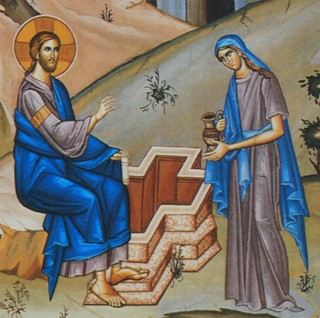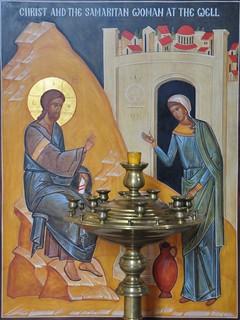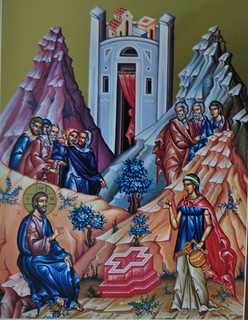The fifth Sunday after Pascha is based on the Gospel lesson from John 4:5-42, the Samaritan Woman, whose name according to Church tradition is Photini. Below are some of my own thoughts about the Gospel as I meditated on it.
The Lord came to a city of Samaria, called Sychar, near the field that Jacob gave to his son Joseph. Jacob’s well was there, and so Jesus, wearied as he was with his journey, sat down beside the well. It was about the sixth hour. There came a woman of Samaria to draw water. Jesus said to her, “Give me a drink.” For his disciples had gone away into the city to buy food.
 Although some modern “biblical” scholars think the idea of the incarnation of God was made up by later generations of Christians, I’m in and with the Orthodox Tradition that does believe Jesus is God in the flesh. So I find this Gospel lesson fascinating in that Christ, the God-man, begins the conversation by asking the woman for a drink of water. He is thirsty and in need and God-man though He be, He is fully human and in need of other humans to meet his own needs. Christ needs the woman’s help and is not afraid to ask for it. It certainly isn’t what we would expect in a conversation with God – that God would turn to us to help meet His need.
Although some modern “biblical” scholars think the idea of the incarnation of God was made up by later generations of Christians, I’m in and with the Orthodox Tradition that does believe Jesus is God in the flesh. So I find this Gospel lesson fascinating in that Christ, the God-man, begins the conversation by asking the woman for a drink of water. He is thirsty and in need and God-man though He be, He is fully human and in need of other humans to meet his own needs. Christ needs the woman’s help and is not afraid to ask for it. It certainly isn’t what we would expect in a conversation with God – that God would turn to us to help meet His need.
The entire idea of the incarnation completely turns on its head any idea of the almighty, omniscient and eternal God. God is also humble and desires to be in communion with His human creatures. God wishes to be able to turn to us in humility and to ask for our love.
The Samaritan woman said to him, “How is it that you, a Jew, ask a drink of me, a woman of Samaria?” For Jews have no dealings with Samaritans.
 Obviously in the story, the Samaritan woman sees only a “hated” Jew before her. Yet, she is willing to see beyond natural prejudice and at least treat him as a human. This is a theological act on her part. For none of us are trying to escape our humanity. Even God is not trying to escape our humanity, for He has become incarnate as a human being! To recognize another as human is to be lifted up to see the image of God which is in each of us. Sadly, often we are not able to do this.
Obviously in the story, the Samaritan woman sees only a “hated” Jew before her. Yet, she is willing to see beyond natural prejudice and at least treat him as a human. This is a theological act on her part. For none of us are trying to escape our humanity. Even God is not trying to escape our humanity, for He has become incarnate as a human being! To recognize another as human is to be lifted up to see the image of God which is in each of us. Sadly, often we are not able to do this.
Jesus answered her, “If you knew the gift of God, and who it is that is saying to you, ‘Give me a drink,’ you would have asked him, and he would have given you living water.” The woman said to him, “Sir, you have nothing to draw with, and the well is deep; where do you get that living water? Are you greater than our father Jacob, who gave us the well, and drank from it himself, and his sons, and his cattle?”
She is puzzled and intrigued. She continues to respect His humanity and even begins a spiritual understanding of Jesus by comparing Him to Jacob. She has begun a religious experience, simply by treating Him as a human being. In recognizing His humanity she is beginning to see God in and through Him.
Jesus said to her, “Every one who drinks of this water will thirst again, but whoever drinks of the water that I shall give him will never thirst; the water that I shall give him will become in him a spring of water welling up to eternal life.” The woman said to him, “Sir, give me this water, that I may not thirst, nor come here to draw.”
Jesus began the conversation asking the woman for a drink of water to slake His thirst. She already wants the “water” He has to offer. She is moving well beyond any literal understanding of Christ’s words. She knows He has no ability to draw water from the well right in front of them. But she is thirsting for what he offers her. Her spiritual eyes are open.
Jesus said to her, “Go, call your husband, and come here.” The woman answered him, “I have no husband.” Jesus said to her, “You are right in saying, ‘I have no husband’; for you have had five husbands, and he whom you now have is not your husband; this you said truly.”The woman said to him, “Sir, I perceive that you are a prophet. Our fathers worshiped on this mountain; and you say that in Jerusalem is the place where men ought to worship.”
The conversation has now become completely spiritual/religious and the Samaritan woman knows it. She is seeing beyond Jesus’ humanity and recognizes in Him the power of God. She knows this is a conversation about truth itself.
Jesus said to her, “Woman, believe me, the hour is coming when neither on this mountain nor in Jerusalem will you worship the Father. You worship what you do not know; we worship what we know, for salvation is from the Jews. But the hour is coming, and now is, when the true worshipers will worship the Father in spirit and truth, for such the Father seeks to worship him. God is spirit, and those who worship him must worship in spirit and truth.” The woman said to him, “I know that Messiah is coming (he who is called Christ); when he comes, he will show us all things.” Jesus said to her, “I who speak to you am he.”
The woman’s understanding of Jesus continues to change – from Jew, to human, to prophet to Messiah. And all of this began not with a debate about theology, or a discussion of morality, or discerning the will of God. It began with a simple request for a drink of water. In that request God revealed Himself in humanity – vulnerable and in need of a fellow human being. The Samaritan woman revealed his own humanity in overcoming her own prejudices and responding as a human to a fellow human. In so doing she was elevated to having a conversation with God.
Just then his disciples came. They marveled that he was talking with a woman, but none said, “What do you wish?” or, “Why are you talking with her?” So the woman left her water jar, and went away into the city, and said to the people, “Come, see a man who told me all that I ever did. Can this be the Christ?”
 Christ in His humanity tells her all that she ever did. She was honest with Him. In Confession, we are given the same opportunity to be honest with Christ. He already knows all that we have done, but in Confession we are given opportunity to acknowledge our own responsibility in what we have done – and to seek God’s forgiveness. The alternative is to wait and let Christ tell us what we have done: “And I saw the dead, great and small, standing before the throne, and books were opened. Also another book was opened, which is the book of life. And the dead were judged by what was written in the books, by what they had done.” (Revelation 20:12). Like the Samaritan Woman, we each are given the chance to be honest with God about our selves and our lives and our sins. It is an important step if we are going to see Christ as something more than a nice man – to experience Him as the incarnate God come into the world to call us to repentance and to unite us to God.
Christ in His humanity tells her all that she ever did. She was honest with Him. In Confession, we are given the same opportunity to be honest with Christ. He already knows all that we have done, but in Confession we are given opportunity to acknowledge our own responsibility in what we have done – and to seek God’s forgiveness. The alternative is to wait and let Christ tell us what we have done: “And I saw the dead, great and small, standing before the throne, and books were opened. Also another book was opened, which is the book of life. And the dead were judged by what was written in the books, by what they had done.” (Revelation 20:12). Like the Samaritan Woman, we each are given the chance to be honest with God about our selves and our lives and our sins. It is an important step if we are going to see Christ as something more than a nice man – to experience Him as the incarnate God come into the world to call us to repentance and to unite us to God.
They went out of the city and were coming to him. Meanwhile the disciples besought him, saying, “Rabbi, eat.” But he said to them, “I have food to eat of which you do not know.” So the disciples said to one another, “Has any one brought him food?” Jesus said to them, “My food is to do the will of him who sent me, and to accomplish his work. Do you not say, ‘There are yet four months, then comes the harvest’? I tell you, lift up your eyes, and see how the fields are already white for harvest. He who reaps receives wages, and gathers fruit for eternal life, so that sower and reaper may rejoice together. For here the saying holds true, ‘One sows and another reaps.’ I sent you to reap that for which you did not labor; others have labored, and you have entered into their labor.”
 While this Gospel pericope has so many wonderful and deep meanings in it, for the moment, I just want to note the disciple’s wooden literalism has prevented them from understanding Christ. This happens in the midst of the lesson of the non-Jewish woman moving from a dead literalism to the Spirit. The contrast is not to be missed. Being a Christian, being a disciple, is not limited to those who zealously belong to bible studies. Many come to a knowledge of the truth even if they aren’t male, or Jewish, or disciples or clergy, or educated, or following correct Tradition.
While this Gospel pericope has so many wonderful and deep meanings in it, for the moment, I just want to note the disciple’s wooden literalism has prevented them from understanding Christ. This happens in the midst of the lesson of the non-Jewish woman moving from a dead literalism to the Spirit. The contrast is not to be missed. Being a Christian, being a disciple, is not limited to those who zealously belong to bible studies. Many come to a knowledge of the truth even if they aren’t male, or Jewish, or disciples or clergy, or educated, or following correct Tradition.
Many Samaritans from that city believed in him because of the woman’s testimony, “He told me all that I ever did.” So when the Samaritans came to him, they asked him to stay with them; and he stayed there two days. And many more believed because of his word. They said to the woman, “It is no longer because of your words that we believe, for we have heard for ourselves, and we know that this is indeed the Savior of the world.”
 Now these non-Jews, not among the chosen disciples, have moved further in their understanding of Jesus from prophet to Messiah to Savior of the world. It is her testimony that brings about this faith in the Samaritans. And it is her testimony about Christ speaking to her about her sinfulness which has inspired her. Confession of sins has led her to the knowledge of the truth about God.
Now these non-Jews, not among the chosen disciples, have moved further in their understanding of Jesus from prophet to Messiah to Savior of the world. It is her testimony that brings about this faith in the Samaritans. And it is her testimony about Christ speaking to her about her sinfulness which has inspired her. Confession of sins has led her to the knowledge of the truth about God.
The Gospel Lesson of the Samaritan Woman comes in the Post-Paschal period when all of the newly baptized Christians begin their education and spiritual growth in what it means to now have been baptized into Christ. Like the Samaritan woman, the confession of sins to Christ opens our hearts and minds to understanding what it means that Jesus is Christ, Lord, God and Savior.
